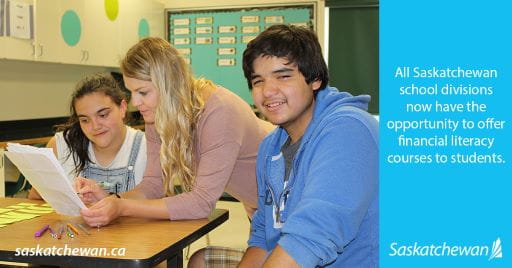Released on February 6, 2020
All Saskatchewan school divisions now have the opportunity to offer financial literacy courses to their students. Financial Literacy 20 and 30 was piloted by 20 teachers in 12 school divisions and two First Nation education authorities.
“Our Government wants to ensure Saskatchewan’s students are provided with relevant and practical curricula that will prepare them for their futures,” Deputy Premier and Education Minister Gordon Wyant said. “Developing additional opportunities for all Saskatchewan students to learn and improve upon their financial literacy empowers them to manage their money effectively, and will be of significant benefit to students throughout their lives.”

The Financial Literacy 20 and 30 electives can be used to fulfill the Practical and Applied Arts/Arts Education requirement for high school graduation. Teachers in grades 7 to 9 are able to introduce financial literacy to their students by using content from this curriculum in middle level Practical and Applied Arts courses. Financial Literacy 20 and 30 addresses financial topics and decisions that students may already be facing while highlighting others they are likely to face within the first few years of leaving high school. It also touches upon more complex topics such as home ownership, debt management and planning for the future, which are part of a lifelong financial journey.
The areas of focus for Financial Literacy 20, 30 are:
- earning – receiving money and/or resources as recognition for paid or unpaid work;
- saving – purposefully setting aside resources for future use and/or enjoyment
- spending – consciously using resources to enhance the well-being of self and others;
- borrowing – taking something on loan, with a promise of returning it, or its equivalent, often at a higher value, by a specific time;
- sharing – giving of one’s skills, abilities, time or resources to enhance the well-being of community and self;
- investing – engaging in reflective decision-making for future benefit; and,
- protecting – recognizing, appreciating and maintaining the value and worth of oneself, community resources and the environment.
"Saskatchewan’s school boards recognize the importance of financial literacy and our members passed a resolution in support of developing elective personal finance classes for high school students,” President of the Saskatchewan School Boards Association Dr. Shawn Davidson said. “In our recent engagements with more than 10,000 people as part of the developing a shared vision for the future of education in Saskatchewan, we heard a clear desire from students, families and communities for increased opportunities to learn life skills such as budgeting and money management. We welcome the availability of these classes across the province.”
Boards of education will determine what schools will offer these classes within their division, supporting the local needs of their students.
-30-
For more information, contact:
|
Chris Hodges |
2020-49 - Financial Literacy Now Available - News Release - French
